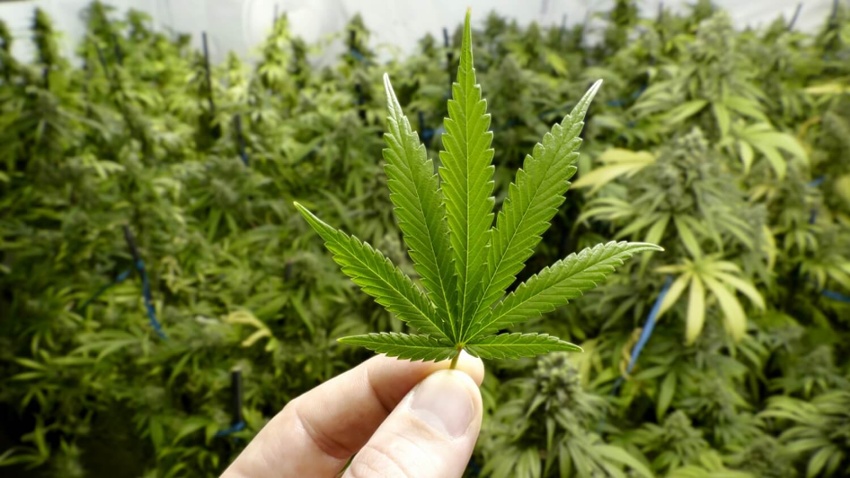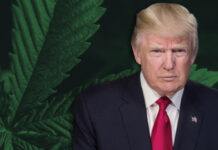Over the past year, the nationwide market for CBD has exploded. Products containing cannabidiol (CBD) are now available at CVS, Rite Aid, Walgreens, and independent retailers across the country. That spike in demand has also opened an opportunity for fraud. And the currently murky legal environment that surrounds CBD has proven too tempting for some veteran swindlers to resist.
I was the victim of one of them.
The same guy swindled Montel Williams, too.
 When Montel Williams founded a lab-verified CBD company, he didn’t figure on fighting fraudsters.
When Montel Williams founded a lab-verified CBD company, he didn’t figure on fighting fraudsters.
Trust Is Hard-Won
It’s not unusual for a fraudster to enter the CBD space. Because the product may be sold with almost no state or federal oversight, consumers are purchasing CBD based on trust in brand names alone—many of which are brand new. In 2019, the only CBD products subject to mandatory purity and potency testing are those purchased in state-licensed cannabis stores.
Last week’s historic FDA hearing on CBD, the first ever held by the federal agency, featured a number of stakeholders complaining about products that, when lab-tested, proved to have little or no actual CBD. So a trusted spokesperson and brand founder like Montel Williams carries a lot of value in the industry.
There’s a lot of junk and fraud in the market right now, and most manufacturers get away with it. What’s unusual in this case is that the fraudster got caught.
The resolution came at a price, though. It cost Montel Williams hundreds of thousands of dollars and two years of time, energy, and frustration.
 (Illustration by Box Brown for Leafly)
(Illustration by Box Brown for Leafly)
It Began With Click Stealing
The whole affair started on April 20, 2017, when Forbes published my article about Montel Williams and his personal effort to produce medicinal-grade CBD oil. The piece included an interview with the former TV host and Lenitiv Scientific founder, and a description of his product line.
Within days, a number of websites began reposting my article. That’s not unusual in itself. Bottom-feeding sites commonly scrape content and republish it as their own, hoping to steal a few clicks. In most cases there’s not much that a writer or publisher can do.
But these weren’t merely scrape-and-post jobs. The articles seemed to use slightly altered versions of my Forbes piece to promote a variety of CBD products unrelated to Montel Williams or his product line.
 (Box Brown for Leafly)
(Box Brown for Leafly)
Lady Gaga Loves the Stuff, Trust Me
A little more Googling turned up a lot more fakery. In a range of pages across different sites—including ones designed to mimic my Forbes contributor page—some mystery publisher was pairing my paragraphs with photos of Montel Williams, and mixing in other material to promote subscriptions for what were purportedly high-quality CBD products. Those same products also appeared on other sites with photos and blurbs claiming endorsements from Bill Gates, Dr. Dre, Whoopi Goldberg, Morgan Freeman, and Lady Gaga.
The whole thing looked sketchy. When was the last time you saw Bill Gates endorse CBD oil?
The whole thing looked sketchy. When was the last time you saw Bill Gates endorse a product? But not every consumer possesses a high level of media sophistication. To a lot of people, these sites looked legit.
Within weeks of our interview, both Montel Williams’ company and I were contacted by people who had seen our names, pictures, and much of that Forbes piece regurgitated on these iffy-looking pages. Worse yet, Williams and his company began to hear from patients who had fallen victim to the sites’ scams.
Apparently, consumers were being peddled a “free trial” offer for the fake CBD. Once they signed up, that free trial turned into a costly self-renewing subscription. These people felt swindled. I received a steady trickle of such reports. Williams and his company saw a deluge.
 (Box Brown for Leafly)
(Box Brown for Leafly)
Credibility Theft
When these fake products cropped up, Montel Williams was midst of launching a startup company that traded on his fame, reputation, and his promise to personally test every product batch. Instead, he found his name used to scam untold numbers of patients out of their hard-earned money, while sending them a product he couldn’t vouch for or control.
‘When this thing started, it was terrifying,’ said Williams. ‘People were angry and I had no idea what they were selling.’
“When this initially started, it was pretty terrifying,” Williams told me in a follow-up phone call, more than two years after our initial interview. “We had somebody out here selling something in my name, and people who were really angered by the way the service was going, and I had nothing to do with this.”
“At the same time, I was launching a brand-new product, designed to be one of the most efficacious in the marketplace, and I had no idea what they”—the fraudsters—”were actually selling.”
What’s In the Product?
What they were actually selling wasn’t even CBD.
Attorneys for Williams obtained examples of the fake-Montel products and forwarded a sample to Leafly.
We had the fake-Montel product tested at a certified lab. They found no CBD in the bottle.
We asked the experts at Confidence Analytics, a state-licensed cannabis testing lab in Seattle, to scrutinize the product. They put it through the same tests that state-licensed cannabis products are required to undergo.
The result? No CBD detected. None.
Pat Reynolds, director of operations at Confidence Analytics, told us that “the sample smelled like hemp seed oil, and the density of the material corroborates that observation.”
The sample may have come from a hemp plant, Reynolds said, but it was likely produced by using an oil pressing technique from seeds, which doesn’t extract cannabinoids from the vegetation. Cannabinoids like CBD are expressed in the leaves and buds of the cannabis plant, but not in the seeds.
 In this lab report from Confidence Analytics, “ND” stands for “None Detected.” (Courtesy of Confidence Analytics, Seattle)
In this lab report from Confidence Analytics, “ND” stands for “None Detected.” (Courtesy of Confidence Analytics, Seattle)
Mystery Fraudster Stays Hidden
From the start, we knew why someone would do such a thing: easy money. What we didn’t know was exactly who was behind the scheme.
In most cases, fraud like this happens without much recourse. Victims are too embarrassed to complain, local law enforcement has higher priorities, and few people have the wherewithal to retail the kind of bulldog legal team it takes to expose a fraudster.
As it happened, though, Montel Williams had the wherewithal. He also had the motivation: A deep desire to deliver high-quality CBD to patients in need and to clear his own name.
 (Box Brown for Leafly)
(Box Brown for Leafly)
Meet Tim Isaac, Arizona Bodybuilder
After six months of painstaking research and digital connect-the-dots, Williams and his legal team discovered the man behind the operation. Court papers filed with the U.S. District Court in Miami in Nov. 2017 alleged that Timothy K. Isaac, a businessman based in Scottsdale, Arizona, had used at least three companies to intentionally and “blatantly” use Montel Williams’ name and reputation, without his permission, to sell what were purported to be CBD products.
A businessman connected to Chinese Viagra and outed on The Ripoff Report.
Isaac appeared to be an Arizona entrepreneur and former competitive bodybuilder who had previously faced legal action over online sales of Chinese-sourced imitation Viagra, among other odd dealings.
In the lawsuit filed by Williams and his company, Montel Williams Enterprises, lawyers described Isaac as an unscrupulous operator who sold “purported CBD oils” as part of “unscrupulous businesses [and] online scams that are deceiving customers.”
According to the lawsuit, Isaac hid behind a multitude of companies with names like Advanceable Technology and Snowflake Marketing. One of his companies, Beauty Strong, had morphed twice previously, having started out as a concern known as Secrets of Isis before becoming Hathor Secrets, and then finally Beauty Strong. Advanceable Technology had previously been put on notice online by both Ripoff Report and the Better Business Bureau.
The products themselves were reportedly marketed under a variety of brand names: Revive CBD Oil, Pure Isolate CBD, Pure Natural CBD Oil, TrueMed Hemp Oil, Hemptif CBD, Assured CBD Oil, and Sky CBD.
More Scam Victims Emerge
In October 2017, shortly after Williams filed the lawsuit in Miami, I wrote about my experience getting caught up in somebody else’s scam. In the months that followed, victims of the fake CBD subscription service did their own online research and found my work. They contacted me and detailed their own ordeals, first getting sucked in by the come-on, then trying desperately to cancel their expensive “subscription.”
Montel Williams
The case seemed to attract its own sub-genre of odd characters. One individual reached out to me on multiple social media platforms (with accounts that featured different spellings of the same name, for whatever that’s worth). They claimed to work for Mr. Isaac, and said I had the wrong idea about him.
I said I’d be glad to speak with Mr. Isaac and hear his side of the story. I knew Williams’ legal team had struggled to make contact with Isaac, so this would have been a real break in the case.
Of course, I never heard back.
Several months later, the same Isaac employee messaged me again. This time they renounced Isaac and accused him of being a huckster. I never got their real name, so I’m not sure if this person ever actually existed, or was a third party just trying to get in on the action and work some as-yet-unclear angle.
If You Find the Guy, He Owes Me Money
The case plodded along for months. Williams’ legal team worked to track down and confront Isaac and the third-party marketers who built the plagiaristic web pages.
Some of those third-party marketers, in fact, were trying to reach Isaac themselves—because they claimed the guy owed them money. Within days of Montel Williams filing his lawsuit against Isaac, one of Isaac’s vendors filed their own suit alleging nonpayment of services.
What You In For? Viagra
As time went on, more information emerged about Timothy K. Isaac. In addition to the accusations about peddling Chinese-sourced Viagra online, The Phoenix New Times reported that in 2009 Isaac pleaded guilty to “a slew of [federal] charges related to his illicit company” in the Chinese Viagra case. He later served a short prison sentence.
If nothing else, the man seemed to live a curious financial life. In the course of the case, it emerged that Isaac had applied for Social Security disability in 2006, received $35,000 in benefits, and taken out a mortgage on a $2.9 million house the same year.
In fairness to Isaac, 2006 was the height of the real estate mortgage bubble. If he took out a mortgage for which his income did not quality, he was hardly the only person in Arizona to do so that year.
 (Box Brown for Leafly)
(Box Brown for Leafly)
Finally, a Resolution
As months stretched into years, I kept an eye on the case but heard nothing from Williams’ legal team.
Finally, in early April, I received an emailed press release.
“Mr. Williams is pleased to announce today that we have resolved our lawsuit against Mr. Isaac and his various affiliated entities,” wrote Jonathan Franks, a spokesman for Williams and Lenitiv Scientific.
“It’s important to remember that these scams were anything but victimless,” Franks added. “They were, in fact, calculated to prey on vulnerable consumers, many of whom have chronic illness or other disabilities. As we explained in the Complaint, we heard from elderly customers and veterans on fixed incomes who incurred unexpected overdraft fees as a result of these scams.”
Less Than Satisfying
The settlement doesn’t provide monetary compensation. But it does require Timothy Isaac to permanently refrain from using Montel Williams’ name or likeness to promote any product. It’s essentially a cease-and-desist agreement. Which is what Williams wanted all along. It just took him two years and untold billable hours to get it.
Jonathan Franks, Spokesperson for Montel Williams and Lenitiv Scientific
“We required this in order to protect consumers from being further harmed by these deceptive marketing practices,” said Jonathan Franks, a spokesman for Williams and his company. “It’s important to remember that these scams were anything but victimless. They were, in fact, calculated to prey on vulnerable consumers, many of whom have chronic illness or other disabilities.”
He also noted that their legal fight involved multiple parties in addition to Isaac, and that attorneys for Williams plan to keep digging.
“The lawsuit was part of a larger, ongoing effort to hold accountable numerous individuals and entities, who through the use of affiliate network marketing, flooded the internet with false endorsements using Mr. Williams’ name and likeness to deceive consumers into buying CBD products,” Franks wrote.
“Thus far, we have settled with several other marketers unrelated to Mr. Isaac who engaged in similar conduct and our ongoing investigation may well result in further legal actions.”
Easy to Scam, Tough to Stop
Timothy Isaac declined to respond to Leafly’s attempts to contact him. He did release a statement to High Times, though, in which he expressed remorse over his customers’ bad experiences. Isaacs re-emphasized his position that he “never sanctioned” the use of Williams’ name or image:
“We are truly sorry to Mr. Williams and anyone who purchased our CBD Oil products if they were misled into believing that Mr. Williams had endorsed or was otherwise affiliated with these products. I used affiliate networks and affiliate publishers to promote my products and several of them apparently used Mr. Williams’ name and image without permission, although I did not direct them to do so.”
In an age when online culpability is perhaps the slipperiest fish of all, the work of holding online marketers and fake-CBD sellers to account is likely just beginning.
Products containing toxic substances, unwanted adulterants, or simply no CBD have been around for years. FDA tests of CBD products in 2015 and 2016 found massive disparities between the CBD promised on the label (a lot) and the CBD found in the bottle (almost none). Until recently, regulators haven’t been interested in getting involved. In fact, the FDA just held its first public hearing on CBD last week.
Williams Will Keep Fighting
For Montel Williams, this current state of the CBD marketplace gives him all the more reason to fight back against bad operators.
“I’m glad we decided to go ahead stand our ground,” Williams told me recently. “For some reason, a lot of celebrities and big brands have decided it’s the cost of doing business. But it’s not the cost of doing business: It’s your name.”
Montel Williams
“If more and more names and companies step up to the plate, and fight this battle in court, then people who mislead the public will run, and we will convince more judges that this is a viable argument. If they don’t think the industry cares, they won’t take time to put pressure on [bad operators] either. It is an expensive proposition to wage a war again these perpetrators, but much more of an expensive proposition to have your name and brand sullied, and people putting trash in the marketplace in your name.”
“The cost of stopping scammers is high for now, but if enough of us band together and say ‘Enough is enough,’ we will take away their war chest—the money they get from scamming people—then they won’t be able to fight anymore.”
Until CBD products are safe and accessible across the country, consumers must also be ready to band together, do their research, and say ‘Enough is enough’ to the industry and people whose job it is to pass laws on our behalf.











